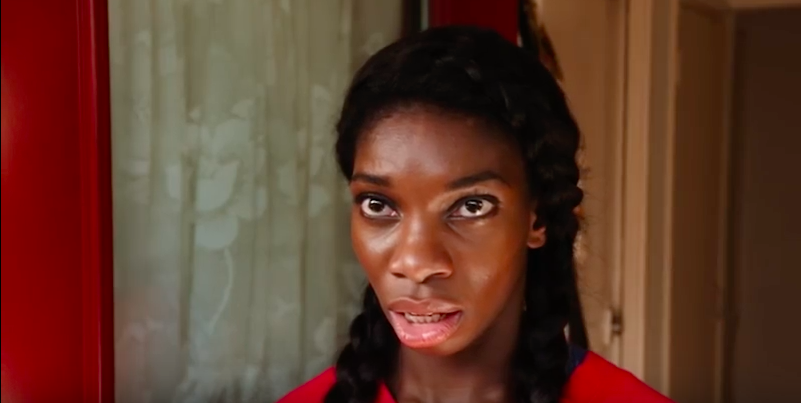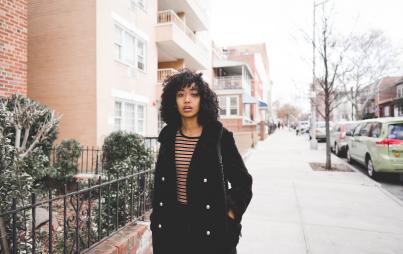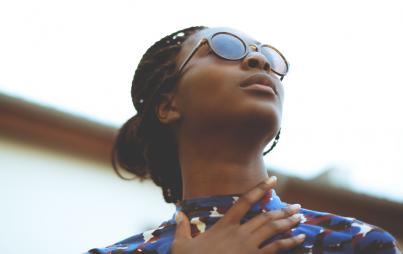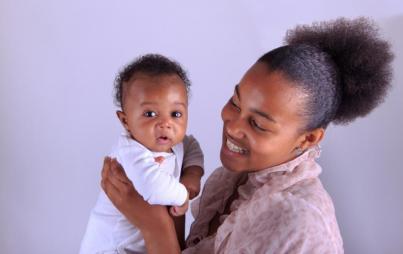
Tracey is allowed the space to make dumb mistakes. (Image: YouTube/ E4)
Not too long ago I was asked by a friend what I, as a Black woman, wanted to see more of on television. When you consider just how much the TV landscape has changed over recent years, that had the potential to be a really tough question. The availability of decent programming is so high that it has become marginally easier to dive into something that you may have been searching for, regardless of how basic or obscure your desires may be. Three years ago, for example, I never would have imagined finding a show that perfectly blended my loves of musical theater, comedy, feminism, and accurate portrayals of mental illness. Now, I'm patiently awaiting season three of Crazy Ex-Girlfriend.
Still, something was missing in a significant way. While we're fortunate enough to have more options with the emergence of Empire, Queen Sugar, Insecure, and Atlanta, I felt like I could (and should!) ask for more. The adult me has basked in the glamorously cunning force of nature that is Cookie Lyon and seen some of her most intimate friendships mirrored by Issa and Molly. A younger version of myself, however, had yet to experience the joy of seeing some semblance of herself on her TV screen, and I still believed she was owed at least that much.
So I answered my friend honestly: I wanted an awkward coming-of-age story that centered Black girls, and I needed it to be a comedy.
It may seem like relatively mundane formula, but the reality is that the humorous coming-of-age tale in both television and film has always been oddly reserved for whiteness. That's certainly never kept me from carving a small space in my heart for movies like Juno or shows like Boy Meets World (because Topanga and Cory will forever be the eternal beacon of love that this darkest of timelines so desperately needs). It just made me long for the chance to see Black girls in the same light: quirky, charmingly naive, and bumbling through youth the way so many of us do. Instead, the retellings of our experiences tend to be marked with some evidence of struggle or tragedy. That may not necessarily make for bad storytelling. It does, however, contribute to a pretty monolithic portrayal that encourages unnecessary pity and further relegates us to the category of “other.” We've always needed something different.
Then one day someone led me to the glory that is Chewing Gum.
I nearly wept in glee.
From the stunningly brilliant mind of Michaela Coel, Chewing Gum follows the cringe-worthy hijinks of Tracey — a spirited, sheltered young woman determined to chase down her sexual awakening at full speed after the end of her first major relationship. Armed with virtually no experience and a strictly religious upbringing, she relies on guidance from the internet and her mature best friend, Candice. Her bumpy journey to sexual liberation includes crash courses on relationships, group sex, fetishism, drugs, love, and so many aspects of sexuality that we all kind of fumble through at some point during our growth.
As we witness Tracey navigate through this newfound section of adulthood, we may feel an array of emotions — second-hand embarrassment, confusion, shock, maybe even some concern — but we never get the sense that she is doomed. There isn't a moment when I think that one of her mistakes will cost her her life, or render her completely ostracized from her community (not permanently, anyway). Tracey is allowed the space to make dumb mistakes, grow from them in some fashion, and then move the hell on. And I honestly can't think of a better summation of youth than that.
As a Black woman, it's important that Tracey's learning doesn't come by way of pain or violence.
Most factions of entertainment rely on the notion that women of color somehow need a horrific event to mark our transition from adolescence to adulthood. It's a trope that is simultaneously harmful, trite, and exhausting. More importantly, it's just not true. While our identities can, and mostly do, have a great impact on how we relate to the world around us, we're just as likely to find our paths via an embarrassing moment, a shitty date, or a petty fight with our best friend. To allow us to be seen making stupid errors without the threat of grave consequences not only subverts tropes, but recognizes us as fully realized human beings.
And to see a dark-skinned Black woman have her confidence despite her inexperience is so affirming, especially when colorism is such a point of concern when discussing representation.
The entertainment industry's preference for lighter skin is so pervasive that watching Tracey own her beauty not only stood out, but felt radical. In a season one episode titled “The Unicorn” there was a moment when she referred to her lips — a feature that is so often mocked in Black women — as simply a challenge to be conquered and not a point of self-loathing. While some of her friends may try to convince her to subscribe fully to conventional beauty standards, she readily owns her body. That acceptance isn't treated as a cautionary tale or a milestone lesson. She simply likes herself, “saggy breasts” and all. That’s glorious.
Chewing Gum is a bright, warm hug for all of us awkward, wide-eyed Black girls who still have so much to learn.
I hope the 18-year-old version of myself is watching and enjoying its loving embrace in between genuine, gasping laughs.








